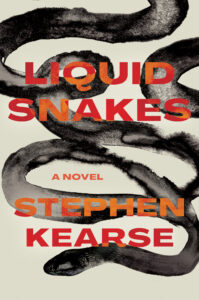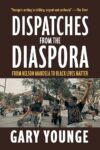
[Soft Skull Press; 2024]
“You do not need permission to be free, but you might need weapons,” states the terms and conditions of the murky EightBall encrypted messaging app, which launches Stephen Kearse’s speculative thriller Liquid Snakes. Kearse draws from the sensibilities of Afropessimism to build a landscape—with the trappings of America’s crumbling excess—that postulates what comes next. The novel is set at a dizzying speed, close enough to motion sickness to spark an absurdist dialogue around the conditions and means of uprising.
At the (broken) heart of Liquid Snakes are its Black characters who help construct Kearse’s maze: from the biochemist turned bereaved drug maker/poison dealer/coffee shop owner Kenny to the brash and sensitive Epidemic Intelligence Service officer Ebonee to Baltimore, the adopted daughter of a Black gay mayoral candidate determined to sacrifice Atlanta for the sake of his own capital accumulation. Kearse joyfully tosses us into this world with the introduction of the first voice, a gifted student named Valencia who instantaneously combusts from consuming an unnamed liquid on the field of the Harriet Tubman Leadership Academy.
Central to Valencia’s arc is Kenny. He lost his daughter to careless bureaucrats from Kingman Coke and turned his efforts into perfecting grief (both prolonged and anticipatory), hiipower (an Adderall-without-the-side-effects drug), and RST (a toxic liquid that causes its consumers to explode). He arms himself against the wreckage of progress by embracing self-immolation: as he tells his partner Thurgood, “I realized that this country doesn’t deserve us, black people. For centuries it’s tried to erase us. I say we settle up, reset this motherfucker.”
Kenny’s machinations drive the explosive Liquid Snakes. His substance hiipower is the designer drug of choice and his dealings of the chemical RST create martyrs of those who use it. However, his direct action is perhaps best articulated through his messages on EightBall. EightBall’s cold contract language digresses from the app’s functionality later in the novel, which draws in users by promising advice and anonymity. But Kenny is intimately aware of who he is chatting with, and he intercepts their lives by offering them his solution to their pain. Under this guise, he philosophizes with his nephew Maurice, telling him: “if I were a bot I could not even conceive of a different reality because my programming would not allow it.” With EightBall, we come to understand that a significant aspect of Kenny’s insurgent praxis involves recruiting others to die on their own terms.
By purging Black physicality into a boggy pollutant, Kenny is able to re-interpret hegemonic mandates that pose Black people as dangerous. Kearse draws a comparison in a fictional interview with a white Louisiana detective Bobby Ray Leonard from “Tumbling Stone Magazine.” The uncritical profile proudly describes Leonard’s conflation of his investigation of the neo-Nazi terrorist militia group comically named “Aryan Hammer” with a Black trio who needfully bombed (with zero casualties) the homes of white residents who hoarded monuments of Black history. Seized objects included a bullet shell that killed Fred Hampton and one of Harriet Tubman’s bonnets. Kearse’s intertextuality is a brief, but memorable, satirical glimpse into a persona in this novel and further necessitates the actions of Kenny and those who willingly combust from consuming RST.
However, the realization of fantasy is never simple. The continuously shifting perspectives in Kearse’s novel challenge incendiary suicides by RST. These mostly public suicides pose a problem; if America doesn’t deserve Black people, how can we as readers claim a perverse voyeurism of Black death? But, revolution doesn’t come with a checklist. For instance, the teenaged Maurice epitomizes the fantastical possibilities of upward mobility through Black excellence yet expresses his malaise in EightBall messages with Kenny. Maurice’s suicide by RST while he pitches at his baseball game can be interpreted as a reclamation of self. He chooses to die before he must fulfill the tropes that have been thrust on him. His incredibly public suicide is an ending for him, but it is a display that causes more dissension.
While Kenny observes this baseball game, he ponders the decline of the American pastime. Kenny avows that “clarity has value, sure. But time of death was just a bureaucratic device, a tool for neat management of entropy. Entropy never equaled zero, and every bureaucracy suffered from leaks, so the funk of a corpse, especially one positioned right under a nation’s upturned snoot, should have gotten the word out.” Kenny is a cunning character whose products challenge ethics. Yet, at his core is more of a cross between mellow surrealist Darius from Atlanta, grieving cynic Theo from Children of Men, and a climate scientist who wakes and bakes before his day job. He has been hurt by the carefully constructed cruelty of capitalism and doesn’t so much want to lift the veil but set it ablaze.
Kearse’s structuring of his novel with this unreliable community of characters who reject the dichotomy of antagonist/protagonist by making shockingly stark decisions plunges the knife deeper and deeper into a retributory consciousness. After all, reliability is for your mother, your friends, not your narrator or government. The climax is fundamentally motivated by a previously stable character’s commitment to distributing Kenny’s RST, albeit on her own terms. She muses how “she had forgotten the ecstasy of collective revolt. Its openness . . . That was the problem with Kenny’s plan. It was a closed feedback loop, offering no ways in, or out, or forward.”
Trite dystopian nihilism has no function without action. Every person is at least one world, and we all create our shared multiverse whether that actuality is accepted or not. Hopefully, your praxis of resistance is endlessly evolving amidst the co-occurring apocalypses: as EightBall theorizes, “when we die, if reality stays the same, why did we live.”
Alg (like algae) Giordani is a film programmer and writer based in Los Angeles. Her passions include loud music, slow cinema, and gossiping with people she loves. She can be found indulging in parasocial intimacy on instagram @hella_raiser and curating lists on letterboxed @lighted_match.
This post may contain affiliate links.







